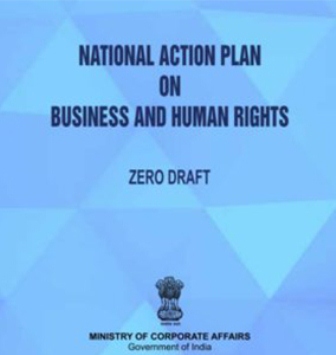Business and Human Rights: From Zero Draft to National Action
In India, the evolving of the National Action Plan on Business and Human Rights is a major step from the Ministry of Corporate Affairs. Its importance is seen in its ability to put human rights in the context of business-citizen interface and make human rights violations done by businesses visible.

The protection of human rights has been an intrinsic part of Indian tradition. As the largest democracy in the world, this can also be recognised in our Constitution in the form of Fundamental Rights and Directive Principles. India’s development agenda, “Sabka Sath, Sabka Vikas” (collective effort, inclusive development) as enunciated by Prime Minister Modi also focuses upon Gandhian Principles based upon the idea that earth’s resources must be used in the interest of society at large.
However, the ground reality is quite different. The infamous Bhopal Gas Tragedy in 1984 that shook the entire nation is the biggest example of human rights violation in the world, as clarified by late Justice J.S. Verma, who is also the former chairman of National Human Rights Commission. The aftermath of the leak showed how an industrial disaster can result into violation of civil, political, economic and social rights for generation after generation.
In the last couple of years, the murder of 13 protesters against the violations by Sterlite Copper Plant in Thoothukudi or deaths of 32 workers owing to the explosion in NTPC’s Unchahar plant in Rae Bareli district of Uttar Pradesh signifies that the business-citizen interface is not only restricted to deprivation or discrimination but clearly about mass violations of human rights in the name of business development.
The evolution of National Action Plan for Business and Human Rights (NAP) is a significant step taken by the Ministry of Corporate Affairs to introduce human rights in the domain of business and provide certain space which showcases human rights violations committed by businesses.The Indian government formally announced that it would develop a National Action Plan on Business and Human Rights in India at the Business and Human Rights Forum in Geneva in November 2018. In February 2019, India published a draft NAP on Business and Human Rights, known as the ‘Zero Draft’.
National Action Plan provides an overview of India’s legal framework setting out the State’s duty to protect human rights, set the corporate responsibility to respect human rights, and access remedy against business-related human rights violations.
The Ministry of Corporate Affairs organised several meetings/multi-stake holder consultations with relevant Ministries of the Government of India, the National Human Rights Commission (NHRC), the Securities and Exchange Board of India (SEBI), domain experts and other relevant stake holders including various integral representatives from business industry associations where issues pertaining to business and human rights were deliberated upon. Regional consultations were also held in Kolkata, Mumbai, Bengaluru and New Delhi.
At the global level, India with the support of United Nations and help of other governments and United Nations Human Rights Council (UNHRC) seeks to promote and protect human rights. Further, the 2030 agenda for Sustainable Development Goals (2030 SDG agenda) focuses upon the realization of human rights in the business sector. India is also one of the first countries in the world to recognize the social responsibility of businesses and statutorily mandate corporate social responsibility, popularly known as CSR.
Also Read : Of Public Purpose, Land Conflicts and Human Casualties
India has also adopted statutory provisions such as National Voluntary Guidelines on Social, Environmental and Economic responsibilities of Business, 2011 (NVGs) and accordingly the National Guidelines on Responsible Business Conduct (NGRBC) have been formulated.
The National Action Plan reaffirms India’s commitment to continue its endeavour to encourage socially responsible business. The UN Guiding Principles on Business and Human Rights (UNGP) envisages Protect-Respect-Remedy principle while the role of the State is to ensure that all three pillars of the principle are working effectively in reality. The Action Plan must set targets for all the three pillars and prepare an Activity Plan, along with a financial memorandum to achieve the same.
The “zero draft” of the NAP which the ministry has circulated primarily is an update of what exists today in terms of legislations, schemes, programmes and listing of various institutions which have mandate regarding Business and Human Rights (BHR). It sets the tone of larger agenda that would notify the Action Plan. The Zero draft, as of now, provides a reference for many of us who are working on the same issue. To that extent, it is good, but listing of several existing programmes shouldn’t take away the need to ‘revamp’ the existing institutions to even become sensitive about BHR agenda. The zero draft has embarked into certain domains which are left out in the State agenda. This Zero draft initiates the preparation of the NAP.
International Labour Organisation (ILO) report of 2018 shows nearly 81 per cent of all employed people in India make a living by working in the informal sector and are consequently at the risk of rights abuses.
On the other hand, over the last 25 years, India is one of the world’s major emerging economic powers. Despite the National Action Plan, UN guidelines or CSR, Indian companies or companies operating in India are working with the old mind-set and are exploiting human rights in the name of business development. Those who are working under CSR view the responsibility as charity done by corporates and not as a necessity.

NAP is a major initiative taken by ministry of corporate affairs by formulating social, economic and environmental guidelines of businesses. But what is needed is, a proper system of checks and balances and monitory measures on companies not only working in India but also on Indian companies working abroad through subsidiaries or joint ventures.
A recent study by Ekta Parishad and CLRA (Centre for Legislative Research and Advocacy) in the AGNOC Publication documented the conflicts related to land rights and business. At present there are 660 land conflicts currently ongoing in India. Gaps in land policies and administrative hindrances with more agricultural investment for corporate benefits result in human rights abuses among agricultural farmers and indigenous communities. Therefore, a comprehensive Business and Human Rights (BHR) framework is required in India to address the issues related land, industries, and agricultural sector.
The recent issues indicate that there is a lack of a body which should act as an interface between State and Business enterprises to ensure that best policies are formulated to promote respect of human rights. The National Human Rights Commission of India (NHRC) plays an important role in BHR. The UN working group strongly encourages all states to develop, enact and update a national action plan on business and human rights as part of the State responsibility to disseminate and implement the guiding principles on business and human rights. Till date, 21 countries have already produced a national action plan while 23 countries are in the process of developing one, which includes India. There are eight countries in which either the national human rights institutions (NHRIs) or civil societies have initiated steps to develop national action plan.
Also Read : Thoothukudi Sterlite Protest: Another Environment v/s Profit War
Thus, there is a need for full adoption of the UNGP on the business and human rights in India. While we have laws to address human rights violations regarding business and private welfare, their practical contributions are rather underwhelming. According to Surya Deva, professor at City University of Hong Kong, the necessity of a BHR framework depends upon on how effective the current mechanisms are.
There is a need to conduct studies to simplify the adoption of the guiding principles, analyse loopholes in the Indian legal framework on BHR, andsee how compliance to human rights measures improves ease of doing business in the country.
A National Action Plan for business and human rights is the need of the hour. It is a new and evolving concept and people aren’t aware about it. If adopted and implemented in a proper manner, it can help in resolving conflicts between human and business rights. For its proper implementation, we need awareness not only among the citizens of the country but even among the policy makers. Through a proper mechanism, the ‘zero draft’ can help in resolving various conflicts which at present have no concrete solution in India.
In the long run a National Action Plan on business and human rights will benefit India as it would help not only achieve the country’s ambitious development agenda, but also reduce business-related risks and rights violations.
(With inputs from Pradeep Narayanan, Director, Research & Capacity Building, at Praxis, New Delhi)
